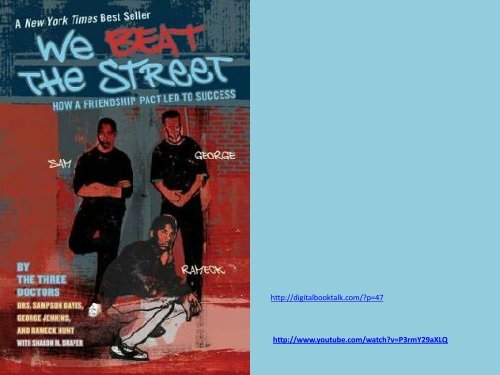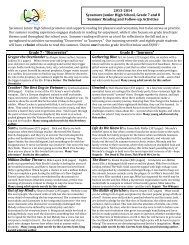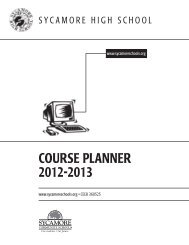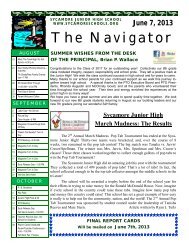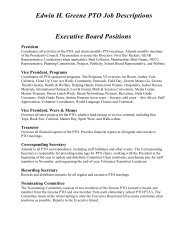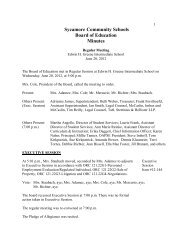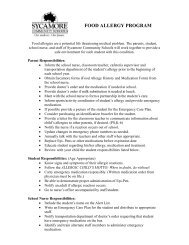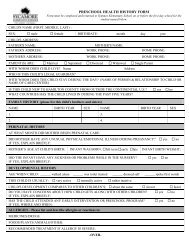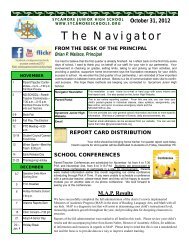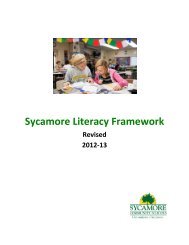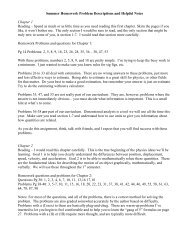"We Beat the Street" Powerpoint for Parents - Sycamore Community ...
"We Beat the Street" Powerpoint for Parents - Sycamore Community ...
"We Beat the Street" Powerpoint for Parents - Sycamore Community ...
Create successful ePaper yourself
Turn your PDF publications into a flip-book with our unique Google optimized e-Paper software.
http://digitalbooktalk.com/?p=47<br />
http://www.youtube.com/watch?v=P3rmY29aXLQ
All School Read<br />
Timeline<br />
February 8– March 15<br />
Each week, a guest speaker will read a chapter over <strong>the</strong> intercom and<br />
introduce <strong>the</strong> next chapter. Connections teachers will lead discussion with<br />
students using talking points. <strong>Parents</strong> are encouraged to discuss <strong>the</strong>se at<br />
home as well.<br />
2/12 Ch. 1 and Ch. 2<br />
2/15 Ch. 3 and introduces Ch. 4<br />
2/19 Ch. 5 and introduces Ch. 6<br />
2/22 Ch. 7 and introduces Ch. 8<br />
2/26 Ch. 9 and introduces Ch. 10<br />
3/01 Ch. 11 and introduces Ch. 12<br />
3/05 Ch. 13 and introduces Ch. 14 & 15<br />
3/08 Ch. 16 and introduces Ch. 17 & 18<br />
3/12 Ch. 19 and introduces Ch. 20<br />
3/15 Ch. 21 and introduces Ch. 22
ABOUT THE THREE DOCTORS<br />
Sampson Davis, George Jenkins, and Rameck Hunt grew up in<br />
Newark, New Jersey, and graduated from Seton Hall University.<br />
Davis and Hunt received <strong>the</strong>ir medical degrees from Robert Wood<br />
Johnson Medical School, while Jenkins earned his dentistry degree<br />
from <strong>the</strong> University of Medicine and Dentistry of New Jersey.<br />
Today, Drs. Sampson Davis, George Jenkins, and Rameck Hunt—who call <strong>the</strong>mselves The<br />
Three Doctors—work in New Jersey area hospitals.
ABOUT THE THREE DOCTORS<br />
In addition to working in <strong>the</strong>ir respective hospitals, <strong>the</strong>y run The Three Doctors<br />
Foundation—creating opportunities <strong>for</strong> inner city communities through education,<br />
mentoring, and health awareness. Their adult book, The Pact: Three Young Men Make a<br />
Promise and Fulfill a Dream, reached <strong>the</strong> top of <strong>the</strong> bestseller lists and led to honors from<br />
Essence, Oprah Winfrey, and many o<strong>the</strong>rs. Speaking to parents and teachers throughout <strong>the</strong><br />
country, <strong>the</strong>se charismatic men received numerous requests <strong>for</strong> a book that would make <strong>the</strong>ir<br />
story accessible to children at risk of falling victim to “<strong>the</strong> street,” which led to <strong>the</strong> writing of<br />
<strong>We</strong> <strong>Beat</strong> <strong>the</strong> Street.
WE BEAT THE STREETS<br />
Discussion Starters<br />
Introduction<br />
1. For what reasons did <strong>the</strong> authors<br />
write this book?<br />
2. What obstacles do you face in your life?<br />
In o<strong>the</strong>r words, what is your street?
Chapter 1: Sampson<br />
“Opportunities”<br />
1. What do we learn about Sampson‟s<br />
neighborhood? What images come to<br />
mind as you read this chapter?<br />
2. A Conversation with Dr. Sampson Davis:<br />
Hanging Tough “Some say <strong>the</strong>re is a<br />
reason <strong>for</strong> everything.”<br />
Food <strong>for</strong> thought:<br />
Discuss how we learn from our<br />
mistakes.
Chapter 2:<br />
“Self-control”<br />
1. Grandma places high expectations on<br />
Rameck. What effect do <strong>the</strong>se<br />
expectations have on Rameck?<br />
2. A Conversation with Doctor Rameck Hunt:<br />
School Problems “Controlling your behavior<br />
is just as important as what you learn in<br />
school.”<br />
Food <strong>for</strong> thought:<br />
Do you agree or disagree with this<br />
quote? Why?
Chapter 3: George<br />
“Setting Goals”<br />
1. What were Miss Johnson‟s expectations <strong>for</strong><br />
her students? What do your teachers expect<br />
of you at <strong>Sycamore</strong> Junior High?<br />
2. A Conversation With Doctor George<br />
Jenkins: Influential Teachers<br />
Food <strong>for</strong> thought:<br />
George talks about how important Miss<br />
Johnson was in his life. Think about a<br />
person who was influential in your life.<br />
Explain <strong>the</strong> role <strong>the</strong>y played in your life.
Chapter 4: Sampson<br />
“Consequences”<br />
1. <strong>We</strong> are who we are based on our experiences<br />
(things that happen to us). How do experiences<br />
in <strong>the</strong> neighborhood shape Sampson and his<br />
neighborhood friends?<br />
2. A Conversation with Doctor Sampson Davis:<br />
Temptation and Its Consequences “<strong>We</strong> never<br />
thought about <strong>the</strong> consequences and never even<br />
considered that our stealing could get us in deep trouble.”<br />
Food <strong>for</strong> thought:<br />
What are examples of bad choices SJH<br />
students make inside and outside of school?<br />
Are <strong>the</strong> consequences <strong>for</strong> <strong>the</strong>se actions<br />
effective enough to change your behaviors?
Chapter 5: Rameck<br />
“Making Decisions”<br />
1. What do you think would have happened<br />
with Rameck if he didn‟t give his mom <strong>the</strong><br />
money?<br />
2. A Conversation with Doctor Rameck<br />
Hunt: Dreams & Missed Opportunities<br />
Food <strong>for</strong> thought:<br />
What should be your guiding principles<br />
when making decisions? Who should<br />
help you develop <strong>the</strong>se principles?
Chapter 6: George<br />
“Moments”<br />
1. What does it mean when George said, “But it<br />
was like Dr. Thomas had plugged in a cord<br />
that buzzed with electricity and excitement.”?<br />
2. A Conversation with Doctor George<br />
Jenkins: The Beginnings of Dream<br />
Food <strong>for</strong> thought:<br />
Think of <strong>the</strong> dreams you have <strong>for</strong> yourself.<br />
What are those dreams and when was <strong>the</strong><br />
first time you thought about <strong>the</strong>m?
Chapter 7: Sampson<br />
“Mentors”<br />
1. What was <strong>the</strong> best advice Reggie gave<br />
Sampson?<br />
2. A Conversation with Doctor Sampson<br />
Davis: Living and Dying in <strong>the</strong> Streets<br />
Food <strong>for</strong> thought:<br />
Why is it some kids survive <strong>the</strong> streets<br />
and and some don‟t? What o<strong>the</strong>r kinds of<br />
“streets” do SJH school students face?
Chapter 8: Sampson and George<br />
“Pride in Academics”<br />
1. Sampson lied to his friends about getting<br />
good grades. Why do you think he did this?<br />
2. A Conversation with Doctor Sampson<br />
Davis: Making Good Grades Sampson talks<br />
about how good grades were not valued by<br />
his neighborhood friends.<br />
Food <strong>for</strong> thought:<br />
Is showing pride in academic per<strong>for</strong>mance<br />
important to students at SJH? What<br />
values do you personally place on<br />
academic success?
Chapter 9: Rameck<br />
“Positive Peers”<br />
1. In this chapter, we see Rameck as an actor<br />
and honor student at University High AND as<br />
a tough street kid fighting and getting shot<br />
at. Who is <strong>the</strong> real Rameck?<br />
2. A Conversation with Doctor Rameck Hunt:<br />
The Call of <strong>the</strong> Streets<br />
Food <strong>for</strong> thought:<br />
What should you consider when<br />
choosing friends who will be positive<br />
influences in your life?
Chapter 10: Sampson<br />
“Say „no‟ to drugs”<br />
1. Why is Sampson able to walk away<br />
from drugs but his friend is not able to?<br />
2. A Conversation with Doctor Sampson<br />
Davis: So Easy to Fall Into <strong>the</strong> Drug Scene<br />
Food <strong>for</strong> thought:<br />
What is <strong>the</strong> most difficult thing about<br />
walking away from something you know<br />
is wrong?
Chapter 11: Rameck<br />
“Making a Positive Difference”<br />
1. Rameck leads a peaceful demonstration to<br />
protest <strong>the</strong> lack of representation of African<br />
Americans in <strong>the</strong> U.S. history textbook and<br />
almost gets expelled from school. What do<br />
<strong>the</strong>se two incidences tell us about Rameck?<br />
2. A Conversation with Doctor Rameck Hunt:<br />
Foolishness and Understanding<br />
Food <strong>for</strong> thought:<br />
Why do peaceful demonstrations often<br />
have a more powerful effect than violent<br />
demonstrations?
Chapter 12<br />
“Strength in Numbers”<br />
1. Just by chance, Rameck, George, and<br />
Sampson listened to a presentation by<br />
Seton Hall University. How much of <strong>the</strong>ir<br />
success is due to “luck” or chance?<br />
2. A Conversation with Doctor George<br />
Jenkins: The Beginning of <strong>the</strong> Pact<br />
Food <strong>for</strong> thought:<br />
How much do you rely on your SJH<br />
friends <strong>for</strong> strength and support?
Chapter 13: Rameck<br />
“Freedom with Responsibility”<br />
1. <strong>We</strong> see two sides to Rameck in this<br />
chapter. Why is he constantly walking<br />
<strong>the</strong> line between good and bad?<br />
2. In A Conversation with Doctor Rameck<br />
Hunt: Thanksgiving in Jail Rameck<br />
notices that <strong>the</strong> o<strong>the</strong>r inmates lacked goals.<br />
Food <strong>for</strong> thought:<br />
What are some goals that every SJH<br />
student should have? Why is it<br />
difficult to stick to <strong>the</strong>se goals?
Chapter 14: Sampson<br />
“Taking <strong>the</strong> „Road Less Traveled‟ ”<br />
1. How did Sampson justify robbing <strong>the</strong><br />
young drug dealers?<br />
2. A Conversation with Doctor Sampson<br />
Davis: Never Again In this chapter,<br />
Sampson realizes „<strong>the</strong> company you keep<br />
plays tremendously in <strong>the</strong> outcome of<br />
your life.”<br />
Food <strong>for</strong> thought:<br />
Do you agree with Sampson? Explain.
Chapter 15:<br />
“Creating a Pact”<br />
1. How did making <strong>the</strong> pact help Sampson,<br />
Rameck and George succeed?<br />
2. Re-read <strong>the</strong> last paragraph of A<br />
Conversation with Doctor George Jenkins:<br />
Streng<strong>the</strong>ning <strong>the</strong> Pact<br />
Food <strong>for</strong> thought:<br />
What message does George give in this<br />
last paragraph?
Chapter 16:<br />
“Seeking out adult role models”<br />
1. The boys were given an assignment to write<br />
an acceptance speech <strong>for</strong> an award <strong>the</strong>y<br />
will receive as doctors. Why did <strong>the</strong><br />
professors want <strong>the</strong>m to focus on an award<br />
speech when <strong>the</strong>y were only students?<br />
2. A Conversation with Doctor Sampson<br />
Davis: The Possibility of Success<br />
Food <strong>for</strong> thought:<br />
What will you say in your acceptance<br />
speech <strong>for</strong> an award you will receive when you<br />
graduate from <strong>Sycamore</strong> Junior High?
Chapter 17:<br />
“Self-discipline”<br />
1. What does Rameck learn about o<strong>the</strong>r<br />
cultures?<br />
2. What do <strong>the</strong> boys do to help o<strong>the</strong>rs?<br />
3. A Conversation with Doctor Rameck Hunt:<br />
The End of Violence and <strong>the</strong> Start of<br />
Giving Back<br />
Food <strong>for</strong> thought:<br />
What kinds of things do SJH students<br />
do to give back? What o<strong>the</strong>r things<br />
could we do?
Chapter 18:<br />
“Hobbies & Careers”<br />
1. What event changed George, Rameck and<br />
Sampson‟s minds about becoming rappers?<br />
2. What did music provide <strong>for</strong> George,<br />
Rameck and Sampson?<br />
3. A Conversation with Doctor George Jenkins:<br />
Rap Stars? “Music was <strong>the</strong> decoration.<br />
Medicine is <strong>the</strong> solid foundation.”<br />
Food <strong>for</strong> thought:<br />
What things in your life could be<br />
considered decoration? What makes up<br />
your solid foundation?
Chapter 19:<br />
“Goal Partners”<br />
1. How did friends help Sampson during his<br />
moment of doubt?<br />
2. A Conversation with Doctor George<br />
Jenkins: Hanging in There<br />
“Try to find someone with goals that are<br />
similar to yours, and use each o<strong>the</strong>r <strong>for</strong><br />
strength and stability”<br />
Food <strong>for</strong> thought:<br />
What kinds of goals is George referring to?
Chapter 20:<br />
“Failure is not an option”<br />
1. React to <strong>the</strong> incident Rameck had with<br />
<strong>the</strong> police?<br />
2. A Conversation with Doctor Rameck<br />
Hunt: The Possibility of Losing <strong>the</strong> Dream<br />
“Everybody goes through difficult periods in life.<br />
The person who is successful is <strong>the</strong> one who<br />
doesn‟t quit.”<br />
Food <strong>for</strong> thought: Think about times when<br />
you were about to give up on something; it can<br />
be as simple as working on a school project.<br />
What kept you from quitting? How can this<br />
lesson be applied to your future endeavors?
Chapter 21:<br />
Discipline Determination Dedication<br />
1. What challenges did Sampson face as a first<br />
year medical student?<br />
2. Rameck is quoted as saying, “…sometimes you<br />
gotta fail in order to succeed.” What have you<br />
failed at only to work harder to succeed?<br />
3. A Conversation with Doctor Sampson Davis:<br />
Going Back to Where it All Began React to <strong>the</strong><br />
last paragraph on page 175.<br />
Food <strong>for</strong> thought:<br />
What opportunities do SJH students have to<br />
show discipline? Determination? Dedication?
Chapter 22:<br />
Sampson= determination & drive<br />
George = long-range vision<br />
Rameck = questioner, activist, encourager<br />
1. George, Rameck and Sampson<br />
graduated from medical and dental<br />
school. Visit <strong>the</strong> websites below<br />
and share your thoughts with <strong>the</strong> three<br />
doctors.<br />
www.threedoctorsfoundation.org<br />
www.threedoctors.com
Conclusion<br />
1. What is your street ?<br />
2. What message do <strong>the</strong><br />
doctors leave with you?<br />
3. What is your plan <strong>for</strong> overcoming<br />
any possible obstacles that could<br />
prevent you from achieving your<br />
dreams? How will you “beat <strong>the</strong><br />
street”?


